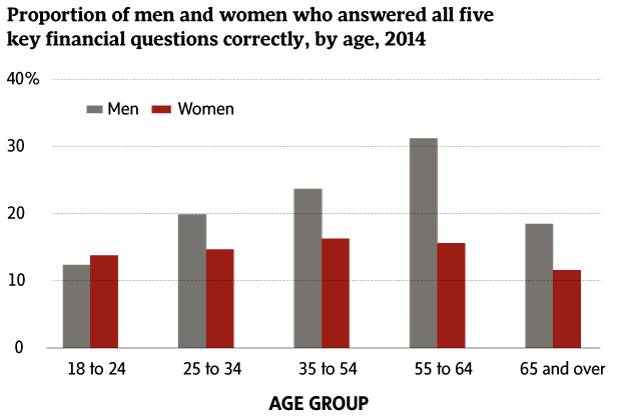
MACKON/THINKSTOCK
As more women become breadwinners at home and leaders at work, their relationship with money and finances is changing – but there are still gaps when it comes to their financial knowledge.
A new study from Statistics Canada gauging financial literacy shows there are some surprising differences between groups of men and women when it comes to financial decision-making and confidence.
Marie Drolet, a senior researcher in the labour statistics division, dug into the numbers to show that age, income and marital status all play a role in the way women understand their finances and plan for their futures.
She took apart the results of a 2014 Canadian Financial Capability Survey, comprising 14 questions about stocks, debt, inflation and other concepts, to show that the overall split between the performance of men and women was statistically significant. Men scored an average of 62 per cent on the quiz, while women scored an average of 59 per cent.
"Financial management may be more of a challenge for women, since they have lower levels of financial literacy and have less confidence in their financial skills," Ms. Drolet wrote in the study.
Gender differences were even more noticeable when the data were broken out to reflect various social dynamics.
At the same time, women are increasingly outearning their husbands, and have become more involved in major family purchases, such as housing, cars and insurance, the study notes. As baby boomers edge toward retirement, women will have greater control over a growing pool of wealth. And women's longer average life spans mean that many will be responsible for spending and saving in the years after their partners are gone.
"As financial markets become more accessible and as alternative financial services become more widespread, managing personal and household finances has become more complicated for many Canadians," Ms. Drolet said.
Here are some of the notable gender differences when it comes to financial knowledge:
YOUNGER WOMEN GAINING
Women 18 to 24 were the only age group to show financial literacy levels that were better than their male counterparts. While the difference wasn't large enough to be statistically significant to researchers, the gap in financial understanding noticeably widens among the cohorts of older Canadians.

SELF-CONFIDENCE LACKING
From a qualitative perspective, women were less likely to describe themselves as financially knowledgeable – only 31 per cent believed they were. Meanwhile, 43 per cent of men believed they fit that description. Women were more likely to respond to at least one question with an "I don't know" response.

SINGLE-INCOME ADVANTAGE
Single career women were the top performers on the quiz, compared with those who were married or in common-law partnerships. Ms. Drolet's report suggests there's also a link between the top earners in a household and the partner with the most financial smarts. "The gender gap in financial knowledge lessens and becomes non-existent as the relative economic contribution within couples approaches and goes beyond parity," the report states.

POSTSECONDARY GAP
Canadian men and women with no university degree performed similarly on the financial literacy test, but there was a pronounced difference among those who pursued higher education. Men with a university degree scored 13 percentage points higher than women. The good news is that the gap is most pronounced among older Canadians. Among those younger than 35, there was no big difference in scores.

MORE READING
Trudeau announces a Canadian woman will grace new bank note
0:37

